Causes and Stages
About Your Kidneys
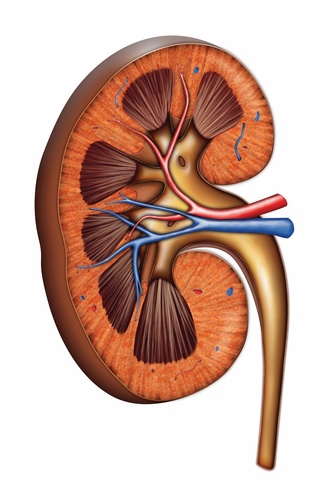
Having a chronic disease can make it feel as if your life has spun out of control. But, knowledge really is power. The things we worry about when we don’t know what to expect can be far worse than what may really happen. Learning about your kidneys is a way to feel more in control of your life and health again. In this section, we will cover:
- What kidneys do
- Stages of CKD and symptoms
- Medicines you may take
- Steps you can take to protect your kidney function
- Common blood and urine tests, and what they mean
What Kidneys Do
The main job of kidneys is to help keep your body chemistry in balance all the time. To do this, kidneys:
-
Make Urine. Your kidneys make urine to get rid of wastes and extra water. Wastes come from some foods, breaking down medicines, and even just moving your muscles.
-
Balance Minerals. Your muscles, blood vessels, nerves, and bones need precise amounts of minerals in your blood all the time. Kidneys sense the levels of minerals in your blood. They hold onto what you need and send the rest to your bladder, as urine.
-
Control Your Blood Pressure. Kidneys keep water and salt(s) in balance in your blood. And, they make an enzyme (renin) that helps your blood vessels tense up to raise your blood pressure if it drops too low. High blood pressure can harm kidneys and cause CKD. Or, CKD can cause high blood pressure. Like the chicken and the egg, it can be hard to tell which came first.
-
Help You Make Red Blood Cells. Each cell in your body needs oxygen to live, and red blood cells bring it. If you have too few red blood cells (anemia), your kidneys send out a hormone (erythropoietin, or EPO). EPO tells your bone marrow to make more red blood cells. Kidneys that don’t work well make less EPO.
-
Keep Your Bones Strong. You need the right level of calcium in your blood all the time to live. Your bones are a “storage bank” for calcium and phosphorus. When you need more blood calcium, the kidneys send out a hormone. Active vitamin D is a hormone that lets your gut absorb calcium from foods. If the hormone signal does not work, your body will pull calcium out of your bones, which can make them weak and more likely to break.
-
Help Keep Acid and Base Balance in Your Body. The pH in your body is close to neutral, but may be a little alkaline, or base (7.38 to 7.42). A pH that is too high or too low can be fatal. Kidneys work with your lungs to keep the right pH level.
CKD Causes
Most CKD in the U.S. has one of two causes: type 2 diabetes or high blood pressure—or both at the same time. These two health problems cause 70% of all kidney failure in the United States. They also cause heart disease and strokes. So, keeping your blood sugar and blood pressure in check can help your whole body.
The health problems below may also cause CKD:
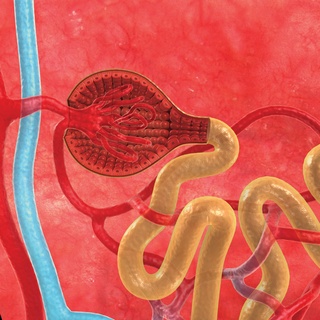
- Glomerular (glom-EAR-you-ler) diseases attack blood vessels in the nephrons. Focal segmental glomerulosclerosis (FSGS) is one.
- Type 1 diabetes - the immune system destroys cells that make the hormone that controls blood-sugar levels.
- Polycystic and other cyst diseases - fluid filled bubbles replace normal kidney tissue.
- Tumors or cancer in the kidneys.
- Lupus - the immunes system may attack the skin, joints, kidneys, and brain.
- NSAIDs (non-steroidal anti-inflammatory drugs)
- Other rare diseases or birth defects.
- Unknown - doctors may not know why the kidneys don't work.
Knowing what caused your CKD may help your doctor to treat it. In some cases, blood or imaging tests can find the causes. In other cases a biopsy of a small tissue sample is needed.
Risk Factors for CKD
When you have a risk factor, it means you are more likely to have a problem than someone who does not have it. But it doesn't mean that you will definitely have the problem.
Some risk factors, like your age or family history, are out of your control. But you can control other risk factors, and perhaps slow down or even prevent some diseases. For instance, keeping your blood pressure and your blood sugar in their target ranges may help your kidneys work longer.
First, know your risk factors for CKD. Then work with your doctor to prevent or delay kidney failure.
Kidney Disease Risk Factors You Can Change
Diabetes
Type 2 diabetes is the number one cause of kidney failure. There's no such thing as “a touch of the sugar.” About 44% of new dialysis patients have diabetes.
What you can do: Kidney disease does not have to happen to people with diabetes. Good blood pressure and blood sugar control can help prevent it. Tight control can have big payoffs in reducing the risk for kidney disease. It can also help protect your blood vessels, limbs, and eyes.
High Blood Pressure (Hypertension)
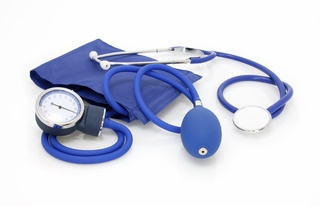
High blood pressure puts extra stress on all of your blood vessels, including your tiny, fragile kidney filters (nephrons). Hypertension is the number two cause of kidney failure.
- Normal blood pressure is less than 130/85 — this is the target for the general public.
- If you have diabetes or protein in your urine, the target is 125/75.
Weight control, exercise, and medications can control blood pressure. Keeping your blood pressure in the target range can help prevent or slow the rate of CKD.
What you can do: Take blood pressure pills as they are prescribed so they will work properly. It is not true that you can “feel” high blood pressure — it can have no symptoms at all. If you can't afford your blood pressure pills or they have side effects you can't live with, tell your doctor. He or she can give you samples, switch you to a less costly drug, or suggest other options for you.
Two classes of blood pressure medications can help protect the kidneys, especially if you have protein in your urine. These are:
- Angiotensin-converting enzyme (ACE) inhibitors (generic names end in “pril”. Such as these.)
-
Angiotensin receptor blockers (ARBs) (generic names end in
‘sartan’.
Such as these.)
If you have high blood pressure and are not taking one of these drugs, ask your doctor if it would be a good choice for you.
Blockages
Urine can back up into one or both kidneys and cause damage, if:
- You have scars from kidney infections
- You have a birth defect that caused a kink in one or both ureters (the tubes that carry urine from the kidneys to the bladder)
- Blood clots or plaques of cholesterol block your kidneys' blood vessels
- Kidney stones block the flow of urine from the kidney
What you can do: Some blockages can be fixed to help save function in a blocked kidney. Kidney stones can be treated. If you know or think that you may have a blockage, ask your doctor what can be done about it.
Overuse of Painkillers and Allergic Reactions to Antibiotics
Heavy use of non-steroidal anti-inflammatory (NSAID) pain pills has been linked to kidney inflammation that can lead to kidney failure. The problem these drugs can cause is called interstitial nephritis. Watch out for drugs with these ingredients.
One pill per day is not harmful in men (at least) who are not at risk for kidney disease.
Allergic reactions to — or side effects of — antibiotics like these may also cause nephritis and kidney damage.
What you can do: If you take these drugs each day, be sure that your doctor knows it. This is especially vital if you already have a known kidney problem. When you are taking a new medication, report any new symptoms to your doctor. Just because you can buy something at a drugstore without a prescription does not mean that it's harmless.
Drug Abuse
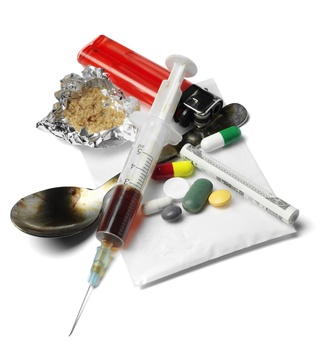
Use of recreational drugs can harm the kidneys and may lead to kidney failure and the need for dialysis. These drugs include:
What you can do: If you are using these drugs, know that they can harm your health and seek help to stop. Be honest with your doctor about your medical history—he or she can't help you without knowing the full story.
Inflammation
Certain illnesses, like glomerulonephritis (inflamed kidney filters), can damage the kidneys. Sometimes the damage is enough to cause kidney failure. Some glomerulonephritis is passed down in families. Some may be an immune response to infections like strep throat.
What you can do: Know your family history. Have a throat culture for a bad sore throat, and treat any strep infection to lower this risk.
X–ray Dye Tests
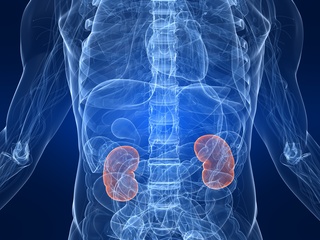
The dye used for contrast (to make soft tissues show up on X-rays, CT scans, and MRIs) can harm the kidneys. This risk is higher if:
- You already have some kidney damage
- You have congestive heart failure
- You have diabetes
- You are dehydrated before an X-ray test is done
- Your systolic blood pressure (the top number) is 80 or lower
- You are 75 or older
If you need one of these tests, be sure to address the following:
- Talk to your doctor, especially if you have a risk factor. Be sure that an X-ray test with contrast is the only way to find out what he or she needs to know. In some cases, a plain-film X-ray or ultrasound may work as well.
- Ask your doctor about n-acetylcysteine (NAC), an antioxidant that is taken by mouth for a couple of days before a test. In some studies, NAC has helped protect the kidneys from contrast damage.
- Be sure the radiologist knows your kidney status so he or she can take precautions.
- Ask the radiologist if you can have an IV with bicarbonate in it before and during the test. Some studies have shown that this can help protect the kidneys, though other studies did not find it any better than normal saline (salt water).
Kidney Disease Risk Factors You Can't Change But Should Know About
A Family History of Kidney Disease
If you have one or more family members who have CKD, are on dialysis, or have a kidney transplant, you may be at higher risk. One inherited disease, polycystic kidney disease (PKD), causes large, fluid-filled cysts that can crowd out normal kidney tissue. Diabetes and high blood pressure can also run in families. Know your family history and share it with your doctor. This can ensure that you are screened for risk factors and get the care you need.
Premature Birth
About one in five very premature infants (less than 32 weeks) may have calcium deposits in the kidney filters (nephrons). This is called nephrocalcinosis. Some people who have this may go on to have kidney problems later in life.
Age
Kidney function declines as we age. The older you are, the greater your risk.
Trauma or Accident
Accidents, injuries, some surgeries, and X-ray dyes can reduce blood flow to the kidneys. This can result in acute (sudden) kidney failure. Some acute kidney failure will get better, but the risk of CKD is much higher if your kidneys have failed before for any reason.
Certain Diseases
Having certain diseases puts people at higher risk of kidney disease. These include:
- Diabetes
- High blood pressure
- Systemic lupus erythematosus (a connective tissue disease)
- Sickle cell anemia
- Cancer
- AIDS
- Hepatitis C
- Congestive heart failure.
CKD Stages

There are five stages of CKD—based on two GFR tests at least 90 days apart. Stages 1 and 2 occur only in people whose kidneys are not normal. They may have been born with just one kidney. They may have kidney cysts, urine that backs up into the kidneys, or protein in their urine. Most people find out they have CKD at stage 3, 4, or 5. In the early stages, the risk of heart disease is higher than the risk of kidney failure. So, to feel your best, you need to protect your kidneys and your heart!
You may have kidney disease and not feel it! A GFR is a test of how well your kidneys work. GFR is glomerular filtration rate. Glomeruli are kidney filters that clean water and wastes out of your blood. A GFR is about the same as your percent kidney function. So, a GFR of 58 means you have about 58% function.
What is My eGFR—and What Does it Mean?
The formula is accurate only for results less than 60. A result over 60 is “normal.” This is good news! But, if you are at risk or have symptoms, talk to your doctor. Ask for a urine test for protein. This test can measure damage that a GFR will not catch.
Kidney Disease Risk Factors
Symptoms that Could Be Due to Kidneys
Stay Healthy!
- Eat a healthy diet with lots of fruits and vegetables
- Get some exercise each day (walking is fine)
- Avoid tobacco (all kinds)
- Go for a yearly checkup
- Keep your blood pressure and blood sugar in control
There are five stages of chronic kidney disease (CKD). Your eGFR means you may have Stage 3 CKD: moderate damage. Treatment may slow or stop the damage. Don’t panic! Most people with stage 3 CKD—80%—never have kidney failure. Their kidneys last as long as they do.
With stage 3 CKD, you may feel fine. Or, you may have symptoms, but not know it. Water and wastes may start to build up. This can cause problems, like:
What Can I Do?
Take this page to your doctor. S/he can:
- Talk to you about your family history.
- Order more tests, like a urine test for protein or an ultrasound.
- Help you control your blood sugar if you have diabetes.
- Help you control your blood pressure if it is high. Some blood pressure pills can help slow CKD. (These are ARBs (angiotensin receptor blockers), and ACE (angiotensin converting enzyme) inhibitors).
- Refer you to a dietitian to choose the right foods.
- Treat anemia, a shortage of red blood cells. This may help your fatigue.
- Approve an exercise plan.
- Help you to stop smoking, if you smoke.
- Review your pain killers. Some, like these can harm the kidneys by blocking their blood supply.
- Refer you to a nephrologist (kidney doctor).
There are five stages of chronic kidney disease (CKD). Your eGFR means you may have Stage 4 CKD: severe damage. The good news is, you may still have time to slow the rate of kidney disease if you get help right away.
With stage 4 CKD, you may still feel fine. Or, you may have symptoms as water and wastes build up. This can cause problems, like:
What Can I Do?
Take this page to your doctor as soon as you can. You may have other health problems, too. High blood pressure, heart disease, and bone problems can occur. If you cannot afford a doctor, look into free or low cost clinics. A doctor can:
- Talk to you about your family history.
- Order more tests, like a urine test for protein or an ultrasound.
- Help you control your blood sugar if you have diabetes.
- Help you control your blood pressure if it is high. Some blood pressure pills can help slow CKD. (These are ARBs (angiotensin receptor blockers), and ACE (angiotensin converting enzyme) inhibitors).
- Refer you to a dietitian to choose the right foods.
- Treat anemia, a shortage of red blood cells. This may help your fatigue.
- Approve an exercise plan.
- Help you to stop smoking, if you smoke.
- Review your pain killers. Some, like these can harm the kidneys by blocking their blood supply.
- Refer you to a nephrologist (kidney doctor). You may need to see the doctor every 3-6 months or so for blood tests and check-ups to help track your kidneys.
Prepare for the Future You Want. There is hope! Some people live for decades after their kidneys stop. Plan ahead. Ask about transplant. Learn the dialysis options so you can make a choice that fits your life. You CAN have a good life with kidney failure—IF you learn all you can, take an active role in your care, and follow your treatment plan.
There are five stages of chronic kidney disease (CKD). Your eGFR means you may have Stage 5 CKD: kidney failure. (End-stage renal disease, ESRD).
When kidneys fail, they stop taking water and wastes out of your blood. These can build up to toxic levels in your body. A kidney transplant or some form of dialysis can help you live. Medicare may help you pay for these.
You may still feel fine. Or, you may have symptoms as water and wastes build up. Dialysis starts when you have symptoms like these and an eGFR less than about 9 or 10:
What Can I Do?
Take this page to your doctor as soon as you can. You need to see a nephrologist (kidney doctor). You may have other health problems, too. High blood pressure, heart disease, and bone problems can occur. If you cannot afford a doctor, look into free or low cost clinics. A nephrologists can:
- Talk to you about your family history.
- Order more tests, like a urine test for protein or an ultrasound.
- Help you control your blood sugar if you have diabetes.
- Help you control your blood pressure if it is high. Some blood pressure pills can help slow CKD. (These are ARBs (angiotensin receptor blockers), and ACE (angiotensin converting enzyme) inhibitors).
- Refer you to a dietitian to choose the right foods.
- Treat anemia, a shortage of red blood cells. This may help your fatigue.
- Approve an exercise plan.
- Help you to stop smoking, if you smoke.
- Review your pain killers. Some, like these can harm the kidneys by blocking their blood supply.
- Help you choose a treatment for kidney failure.
Prepare for the Future You Want. There is hope! Some people live for decades after their kidneys stop. Plan ahead. Ask about transplant. Learn the dialysis options so you can make a choice that fits your life. You CAN have a good life with kidney failure—IF you learn all you can, take an active role in your care, and follow your treatment plan.
Find My eGFR (for adults ages 18-69)



